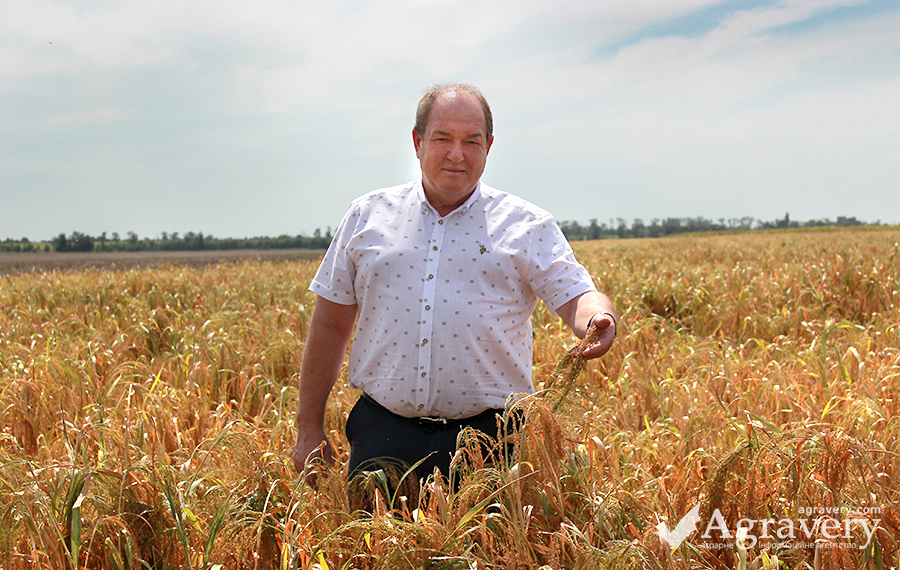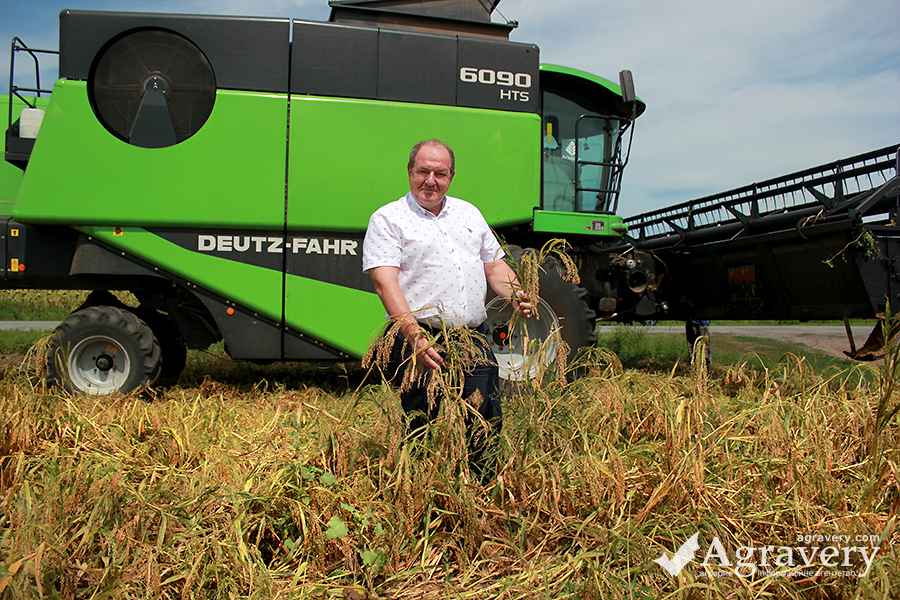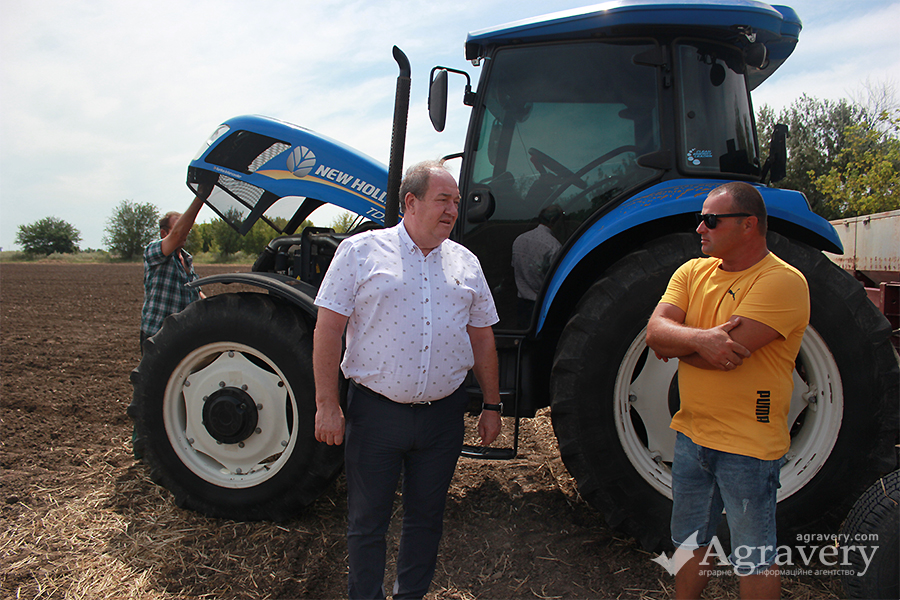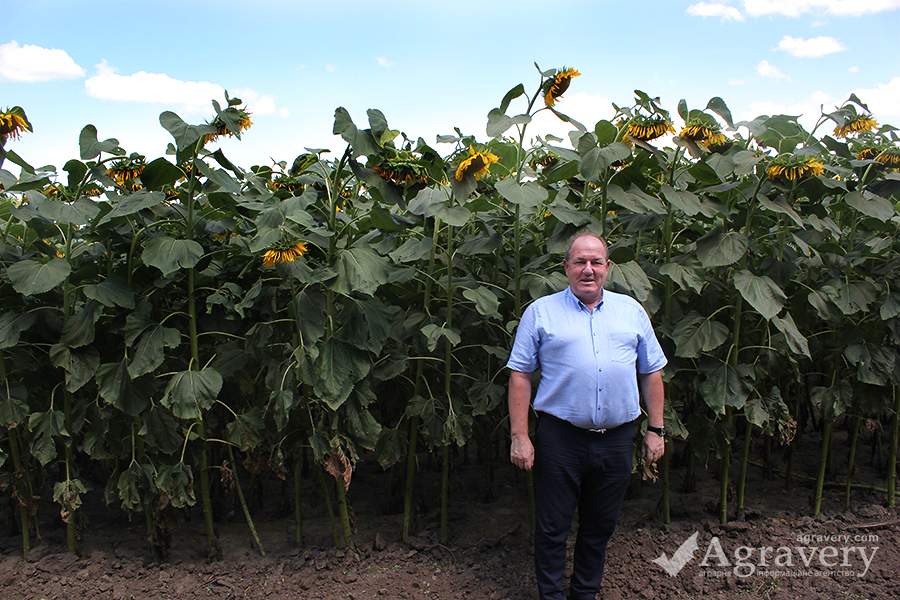
We are talking to Volodymyr Yevtushenko, General Director of "TAVRIIA" PE, about climate change, the situation on the agrochemicals market, peculiarities of growing agricultural crops in southern regions and state regulation of prices.
Tell us about your farm and approach to crop rotation.
Our farm cultivates 5,000 hectares in the south of Dnipropetrovsk region, in the conditions of risky agriculture. We work in harsh climate conditions, we have serious problems with precipitation, lack of moisture. Therefore, we chose the appropriate crops for crop rotation: winter wheat occupies more than 50% of the sown area, we sow winter barley, winter rapeseed, sunflower, and peas to improve soil quality. We sow millet crops because it is drought resistant. Maize was practically abandoned due to lack of moisture, as the yield can be obtained only at the level of 30 c/ha, when more than 100 c/ha are grown in the central regions.
Rapeseed is very expensive this year, will you increase planting of the crop?
We would like to increase rapeseed crops, but it is in August, when it should be sown, we have extremely dry weather conditions. Last year, rapeseed was sown in completely dry land, there was no precipitation for almost 2.5 months. Winter cereals were sown from September 10 to September 30 - we received seedlings when it rained, until the end of October we received rapeseed seedlings as well. Therefore, winter rapeseed is too risky, every year we sow 500 ha and receive a yield of up to 20 c/ha. Oil crops have been too weak this year. We do not know what spring will be like. It would be great if it seemed long to avoid the sudden sun. Because in recent years we have almost no spring, winter quickly turns into summer. With a sharp rise of temperature plants because of lack of moisture are stressed and do not develop. Nowadays this is our biggest problem. We had the same situation before, but with climate changes, conditions become like the Sahara Desert.

Do you have irrigation systems?
Only last year we started the reconstruction of old irrigation systems: partly the local UTC (united territorial community) helped, the rest of the network will be done by our own efforts. We are located near the Kakhovka Reservoir, so there are plans for irrigation in the future, as weather conditions are getting worse every year.
What crops do you plan to irrigate?
We planted a cherry orchard on 10 hectares last year, so we will make drip irrigation under the garden. We plan to set aside 400 hectares for irrigation with sprinklers and partially for drip irrigation. In the specified area we will grow industrial crops, in particular corn, we will also try irrigation of wheat and rapeseed. Then it will be a guaranteed harvest, it will make sense to apply more mineral fertilizers, because we have enough sun to receive higher yield.
The government recently adopted a resolution to compensate 25% for irrigation equipment purchased from domestic producers. Are you interested in buying Ukrainian equipment?
This is a good government program to compensate for the cost of equipment, it really works. We used it when we bought a fertilizer spreader, cultivator, and received compensation. As for irrigation, we will see which national producers are in the state and what they will offer. If the Ukrainian equipment meets the technical and technological requirements, we will definitely take it.
Is it difficult to restore irrigation on leased land?
We have another problem nowadays. There are manganese ore deposits under the lands we cultivate. And nowadays the mining and processing plant buys land shares from the owners (which are cultivated by our enterprise), and sometimes we don't even know that it has already been bought. That means, we are confronted with the fact when the land is confiscated. The law allows the owner of the land to transfer it to ore mining, after which the land is reclaimed and returned - for our enterprise, this is also a danger that we are not notified in time, that is, we are not protected by anyone. According to the latest scenario, we may not be confronted with the fact and we will not even know which fields will be mined, only conditionally, because the area of ore production is constantly expanding. Moreover, it is open pit mined.
That means, all your 5,000 hectares are at risk?
Yes, almost all of them. Ore mining is expanding, it began in the 60's. During this time not only in our farm but others more than 12,000 hectares of land have been dug and dug. The process continues, reclamation or return of land plots are too slow processes, and most importantly, when returning back the soil is in a state almost unsuitable for agricultural activities.

What legislative innovations are needed to change this situation?
If you look at the amount of ore extracted, Ukraine does not need such an amount. Accordingly, it is extracted and sold abroad. It is no longer a public need, it is a commerce one. As it was mentioned, the speed of land cultivation increases every year. But I do not think it is possible to change the situation, because the extraction and export of ore or products of its processing is a profitable business.
Does money solve everything?
Yes, there are huge funds. Although if these lands were left for wheat and corn, I think they would be no less profitable, and the soil would be preserved, and the environment would be better. After all, mining leaves pits, changes underground flows, affects region’s ecosystem, delays precipitation. But it has already happened that chernozem is being destroyed due to ore extraction, this is not shown, and we as farmers can do nothing, this is a state policy.
How long is your enterprise a member of the UAC?
We started our cooperation with the UAC last year. But we already see the benefits. First of all, we received much-needed legal pieces of advice. A qualified seminar on land issues was held with detailed explanations. This is what we need nowadays. Farmers should unite, and thee UAC takes on this responsibility. Because there are a lot of problematic issues in the industry. What is happening today in the markets of mineral fertilizers, plant protective products, lubricants - is a complete bacchanalia.
How can farmers survive when saltpeter costs UAH28,000 per ton today? In order to get the harvest, you need to use 200 kilograms per hectare, then only fertilizers will cost more than UAH5,000. The price of wheat without VAT is UAH7,000 per ton. And you spend funds for fuel, wages, etc. If last year mineral fertilizers cost about UAH12,000 per ton, now prices have increased many times and do not stop. It is unknown when fertilizer prices will be fixed, so there must be some structure to deal with such issues.

Do you think state price regulation is needed?
Nowadays, the agricultural sector is the locomotive of the Ukrainian economy. Source of currency and guarantor of food security. Therefore, who but the state must take control. Last year, Ukraine already harvested 100 million tons. It was a record. But how to fix it? The record did not happen by itself: there was a loan, the 5-7-9 program worked, respectively, farmers had an opportunity to apply more fertilizers, buy better quality seeds, work with technology, someone upgraded equipment. And if today the state loan program works, but there is huge rise of prices for fertilizers and fuel - the record harvest will not be. In addition, autumn seemed dry, and I personally did not see good crops of winter wheat, seedlings were too weak, we have to work with them in spring, they will require increased nutrition - so it is necessary that fertilizers were affordable. Therefore, the state, if it already gives something, must continue ant do not stop, otherwise agricultural production will decline.
Source: Agravery.com
Tuesday, 15 February 2022